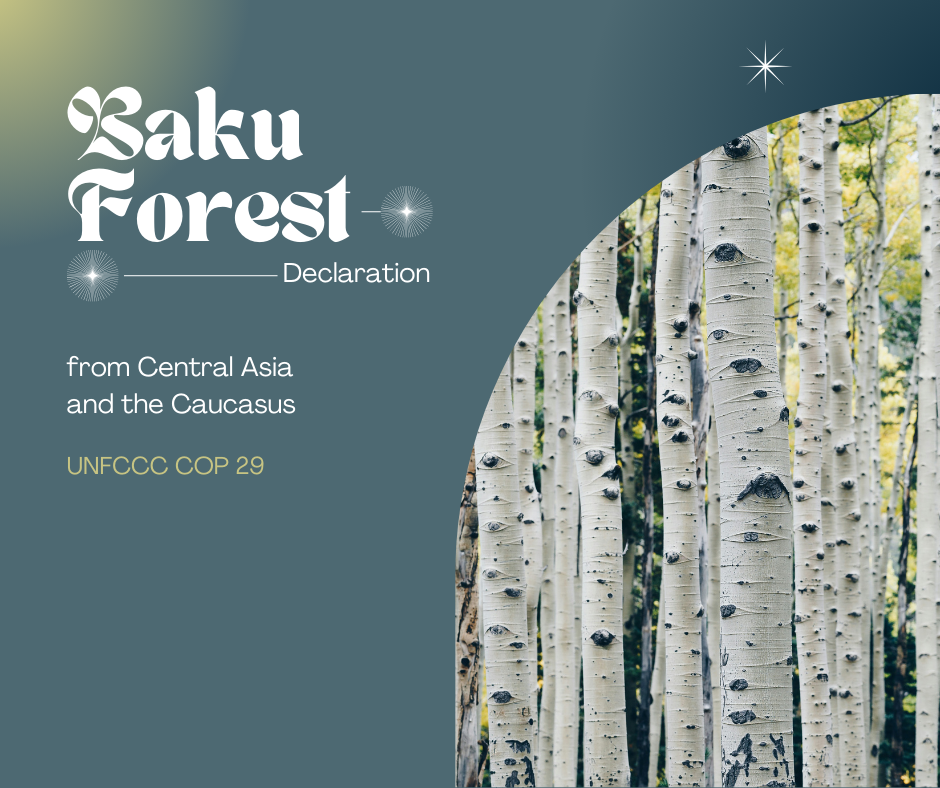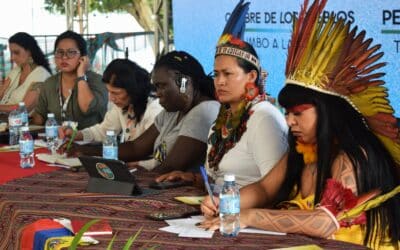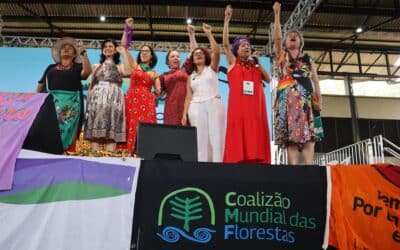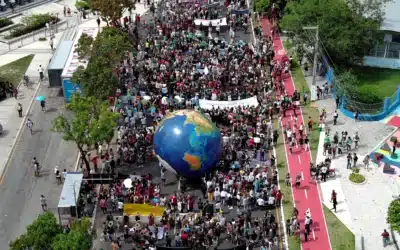
Llamamiento a la Presidencia de la COP 29 y a todas las Partes del Acuerdo de París
Declaración Forestal de Bakú de Asia Central y el Cáucaso
Mientras países de todo el mundo se reúnen para la Conferencia de las Naciones Unidas sobre el Cambio Climático (COP 29), subrayamos la urgente necesidad de una acción climática eficaz que dé prioridad a los derechos de los Pueblos Indígenas y a la protección de los bosques. A pesar de la clara dependencia de los bosques para mitigar el cambio climático, la Convención Marco de las Naciones Unidas sobre el Cambio Climático (CMNUCC) no ha logrado detener o abordar adecuadamente la deforestación y está tratando a los bosques simplemente como sumideros de carbono y mercados de carbono.
Continuar leyendo en inglés…
2024 has been a critical year due to the scale of Amazon fires, which have destroyed forest areas larger than entire countries and wiped out nearly all life in their paths.
Climate change plays a critical role in this situation, but it is also important to note the shortcomings of legal systems and policies that recognize the value of destroyed forests (timber) but do not take into account the huge diversity of life forms that inhabit the forests, which they preserve and which are also destroyed by fires.
We urge climate negotiations to focus on justice, sustainability and equity, and to take into account the voices of those most affected by climate change, namely:
- Recognition of the rights of Indigenous Peoples and traditional knowledge in climate decision-making;
- Commitment to a human rights-based approach;
- The need to stop false solutions such as REDD+ mechanisms and carbon markets;
- The need to reject market mechanisms in addressing climate issues;
- Ensuring funding for community-based, gender just and rights-based solutions;
- Prioritizing climate justice and equity;
- The need to strengthen forest protection in national climate strategies; and
- Ensure fair, just, and equitable transitions.
As COP 29 is taking place in Azerbaijan, this represents a unique opportunity to focus on the protection and restoration of forests in the Caucasus and Central Asia.
The forests of this region play a very important role in water regulation and protection. Mountain forests are «factories» of clean water, the deficit of which is becoming increasingly acute; they provide water to areas located far from mountain ranges.
The impact of global climate change in this region is significantly more noticeable than the global average. Countries in the region should use the “window of opportunity” in the next 10–20 years to implement large-scale afforestation programs aimed at maximum restoration of local natural forest ecosystems, including mountain, desert, and river-gallery forests.
Countries should take measures to preserve existing or previously created tree stands – protecting them from fires, unregulated grazing, logging for infrastructure or development, and mining. In cases where logging is unavoidable, compensatory tree planting should be carried out to a multiple extent and local community initiatives aimed at restoration, expansion and sustainable use of forests should be encouraged.
Particular attention should be paid to the conservation of the floodplain river-gallery (“tugai”) forests of Central Asia, which are recognized as one of the most vulnerable and damaged ecosystems in the world. Floodplain river-gallery forests of Central Asia have exceptional ecosystem and water conservation value. They are subject to degradation due to the economic development of territories, changes in the hydrological conditions of rivers, and the impacts of climate change. The remaining river-gallery forests are subject to unconditional protection and restoration. It is necessary to take measures to promote their natural renewal and the preservation of their unique biodiversity through better management of river flows and the creation of basin management mechanisms at the regional level, through giving special conservation status to the best preserved natural areas, control of economic activities in unprotected areas, and the involvement of local communities in the management of these forests and protected areas.
There is also a need for greater use of alternatives that alleviate the energy poverty of local communities and their dependence on biomass through the introduction of energy-efficient and energy-saving solutions, the active use of alternative renewable energy sources, the creation of fuelwood nurseries and other solutions.
Recommendations to Parties to the UNFCCC in particular governments of Central Asia and the Caucuses:
- Recognize the role of intact ecosystems for climate stabilization. The most important priority for climate stabilization is the preservation of primarily intact and highly productive ecosystems such as natural forests.
- Recognize the role of natural forests in regulating continental moisture transfer.
- Development of continental-level agreements on the conservation of forest belts to stabilize moisture transfer inland and reduce natural disasters such as droughts and floods.
- Put forward an initiative to give a special climate-regulating status to the Eurasian and North American boreal forest belts, with all the ensuing consequences for their conservation and sustainable management.
- Eurasian Economic Union (EAEU) + China countries initiate an agreement to fulfil the above recommendations.
As we approach COP 29, we call on negotiators, governments and stakeholders to act urgently, ensuring that climate action is fair, equitable and inclusive. The future of our planet, modern human civilization, and life in its modern manifestation is at stake.
Signed by
AKMENA, Kyrgyzstan
Armenian Forests, Armenia
BIOM, Kyrgyzstan
BROC, Russia
Eco-Accord, Russia
Eco-TIRAS — International Association of River Keepers, Moldova
Ecolog, Uzbekistan
Friends of the Siberian Forest, Russia
Gamarjoba, Georgia
Global Forest Coalition
Institute for Sustainable Development Strategy, Kyrgyzstan
Karaganda Eco-center, Kazakhstan
Kyrgyz Wildlife Conservation Society, Kyrgyzstan
Union for Defence of the Aral Sea and Amu Darya River, Uzbekistan
Youth Ecological Center, Tajikistan
Endorsed by
Amis de l’Afrique Francophone-Bénin (AMAF-BENIN)
Association for Climate Action Network EASTEN Africa (ACANEA)
Bio Vision Africa (BiVA)
Blue Dalian
Brighter Green
Centre pour la Justice Environnementale Togo
Fundaexpresión
Global Justice Ecology Project
Green Longjiang
Instituto para el Futuro Común Amerindio IFCA
Landelijk Netwerk Bossen- en Bomenbescherming
Les Amis de la Terre
Snow Alliance
Solon Foundation, Bolivia
Tarcísio Feitosa – 2006 Goldman Prize Winner – Forests South & Central America
WALHI, Indonesia
Zambia Social Forum ( ZAMSOF)




